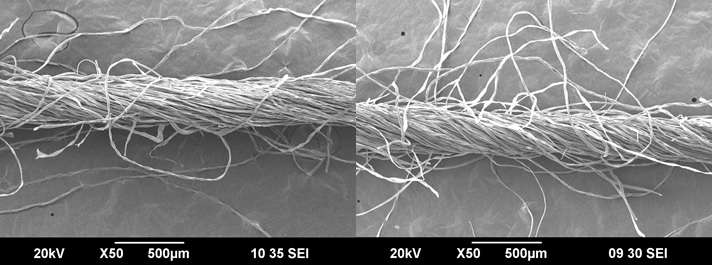Enhancing the productivity of yarn makers

Researchers in Hong Kong have developed a new yarn manufacturing technology that can increase productivity with less energy consumption.
China is the world's largest yarn manufacturer and owns 120 million spindles, accounting for more than half of the world's supply. Yarns are made by bonding a set of single strands of fibre together by twisting them. The more they are twisted, the stronger the yarn. However, a high-twist yarn increases "residual torque" – unwanted curls that decrease productivity and therefore increase production costs.
Led by Professor Xiaoming Tao, researchers at The Hong Kong Polytechnic University have developed a new yarn manufacturing technology, named Nu-TorqueTM, that can spin low-twist yet high-strength singles yarns with low residual torque.
"With acceptable quality and efficiency, our method can reduce yarn twist by 20-40% compared to the conventional method – being the lowest among all ring spinning methods," says Professor Tao.
To develop the technology, Professor Tao and her colleagues first created a new, unique structure for singles yarns by modifying the existing ring spinning machine. Secondly, the team invented a series of spinning devices for raw yarn materials ranging from coarse to fine counts and cotton to wool fibres. The researchers then developed a new method to accurately control the yarn's residual torque on the ring spinning machine.
Their Nu-TorqueTM technology is capable of manufacturing improved yarns with a unique structure while reducing energy consumption by 3.77 million kilowatts per 10,000 tons of yarn. "If half of the spindles in China installed a low twist device, 2.5 billion KWh of electricity would be saved," Professor Tao adds.
Unlike normal yarns, the team's yarn does not require any finishing process such as singeing, smoothing or flattening, thus saving even more energy. The technology is also environmentally friendly, as no steam, water or chemicals are needed during the spinning process. Furthermore, a modification unit, which produces yarns with a unique structure, can be installed on existing ring spinning machines, making it readily available for use.
Nu-Torque is currently used by 19 companies including Luthai Textile Co Ltd, a leading manufacturer of yarn-dyed fabrics headquartered in China. Moreover, the technology is listed among China's national plan to enhance the core competence of the country's textile industries.
Professor Tao says that the next plan is to make commercialised products using the technology. "A wide variety of products have been developed with unique features and high added-value such as cotton sweaters, T-shirts, jeans, flannel clothing and towels.
"Besides that, we will continuously focus on the improvement of this technology," she adds. "For example, our technology can be applied to produce finer yarns and a variety of staple materials."
Provided by Hong Kong Polytechnic University




















